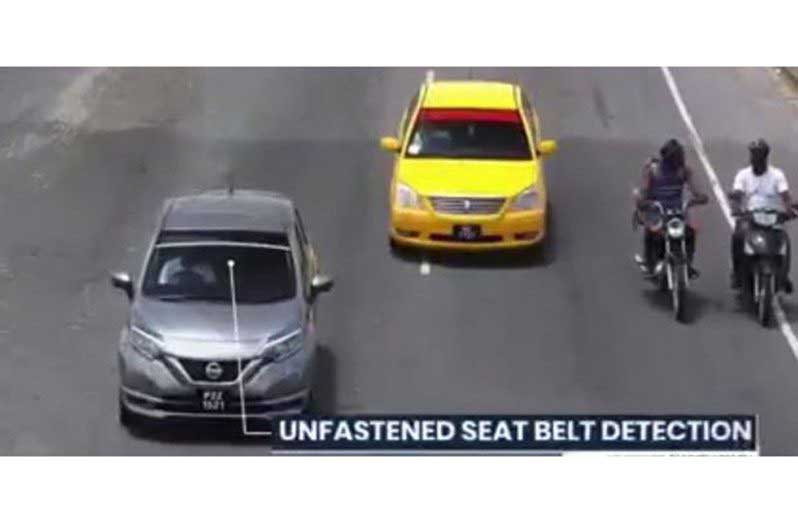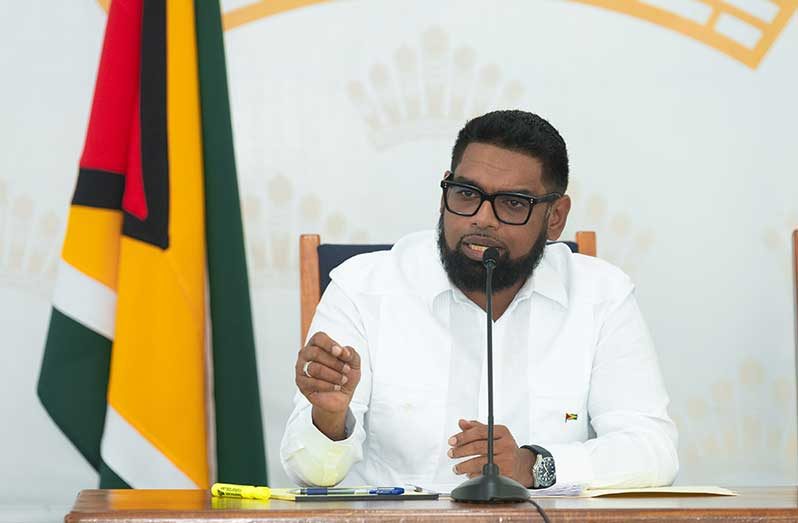–President Ali says; points to importance of ‘personal responsibility’ among citizens in order to support overarching initiatives
MAKING Guyana’s roadways safer and stomping out reckless driving will be further advanced in 2025, President, Dr. Irfaan Ali has announced.
During the 2024 end-of-year press conference on Tuesday, the President commended authorities for the penalties being handed to errant drivers. However, he told the public that more will be done.
In just a short time, Guyana has seen the introduction of innovative technologies to its roadways to bolster safety.
He said: “It is one death too much on the road, and we have to continue to improve the safety on the road. We are a very small population, and we cannot afford to lose our human assets this way.”
The President then discussed several proactive initiatives that are being pursed to improve road safety and the measures that will aid drivers.
As it relates to the state-of-the-art 24-hour surveillance cameras on the major roadways, the Head of State noted that in the testing phase, there were more than 60,000 instances where people were speeding.
With speeding continuing to remain a primary focus, Dr. Ali said that soon, citizens will see electronic speed meters on the roadways, which will tell them to slow down.
He went on to say: “We have the electronic system that would improve transparency, improve accountability, and create a more speedy way through which persons will be held accountable for their actions.”
Although there is still more to be done, Guyana has seen a significant decrease in harm on its roads and the President delved into these statistics.
While giving credit to the Guyana Police Force (GPF) and those in the traffic department for keeping the roads safe, the President said that, up to press time, in fatal accidents, the country has seen a decrease of 20 per cent from last year.
In deaths, there was a decrease of 24 per cent from last year; in serious accidents a decrease by two per cent and minor accidents decreased by three per cent.
Looking at the enforcement side, there has been an increase of 37 per cent in terms of cases made, Dr Ali said.
With greater policing work, he also noted that there were 42,748 speeding tickets issued.
On the topic of summons issued, there has been an increase by over 3,000 since last year. In 2024, 13,364 summons were executed, the President said and for warrants, 2,398 were executed.
On that note, he said: “So you can see that the enforcement aspect, the policing aspect, has also improved substantially and this takes a lot of effort. Of course, this is not only about the police force. It’s about individual choices and individual action.”
The reduction in deaths and all levels of accidents are a result of a number of interventions, the President said.
There will soon be the intensification of the traffic education programme, the strict enforcement of traffic laws with no discretion or consideration given to unlawful behaviour and, action, the use of technology in having a smart country, intelligent traffic cameras and, body cameras, and improved road infrastructure.
There is also a social media education programme and suspensions of driver’s license, and the introduction of the electronic based theoretical examination for prospective drivers, which gives faster feedback for students to customise the exam rules.
Stressing on the importance of responsibility, the Head of State called on citizens to report errant drivers.
He then reminded drivers that they too have a responsibility, not only as road users but also to their families.
RIGID EDUCATION PROGRAME
Aside from the proactive initiatives that are catching these errant drivers red handed, the Head of State said that the country has a very rigid education programme.
Giving figures, he said there are lectures being done in schools, and sessions being held with drivers, bar owners and patrons.
Further, he said that defensive driving sessions across every region, targeting public sector and private sector were also launched.
He even went on to tell the public: “We had many interactions with drivers, operators, citizens, leaders, pastors, imams, pandits, and religious leaders. So all of this is part of the holistic approach in addressing this issue.”
PLANS FOR 2025
For 2025, the implementation of the amendment of the Traffic Act will be looked at along with the full implementation of the e-ticketing system, which the President said will be comparable to the best systems worldwide.
There will also be the maintenance of communication between the GPF and citizens in ways such as WhatsApp groups.
The year 2025 will see enhanced engagement with promoters, DJs and overall, the entertainment industry to promote road safety and security.
Further, the fine system, the suspension system will be made more user friendly.
He said: “I want to make it very clear, the system is not being developed to go after persons. The system is being developed to keep everyone safe, to ensure that we all comply, to ensure that there is transparency and openness. The system is rigid. The system has less human interference for biases, so it’s electronic, it’s technologically driven.”




.jpg)










